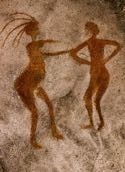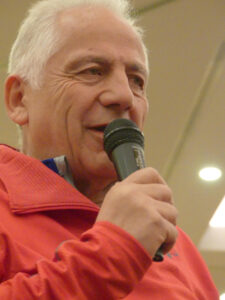CFOR ‘Facilitation for Leaders’
2020 Worldwork Modular Training Programme
‘A facilitator at every table – from the kitchen table to the negotiating table’
with Jean- Claude and Arlene Audergon
This year, CFOR’s modular course will run over a period of 4 months, late January to early May 2020
Not only are you sorely needed, you are your only chance! The keys to facilitation lie within your own practice of awareness. That may be a kind of truism, but worth saying. Ultimately we can each only work at honing our own awareness, to be able to in turn facilitate others. And to discover our own nature, what is cooking inside of us, calling us to make our unique contribution.
The methodologies of Processwork and Worldwork, developed by Arnold Mindell, make it possible to facilitate the inherent ‘process mind’ and creativity in nature, even and especially when grappling with the most difficult themes of our lives as individuals, in relationships, in organisations and community, and in working with the divisiveness and conflict within our wider society and world.
‘Worldwork’ is the application of Processwork to working with large groups and communities. It is a comprehensive theory and practical methodology for working with the collective issues that shape our lives, as individuals, relationships, teams, groups, organisations and communities, and for supporting the inherent wisdom and direction that lies within community. Worldwork methodology is being used around the world in organisations dealing with conflict and change, including in the voluntary sector, business, government organisations, international organisations and for community development. Worldwork methods are also making a vital contribution to processes of conflict resolution, reconciliation and violence prevention.
Facilitating in our view links psychology, spirituality, social action and politics. By bringing awareness along into the ‘field’ of interactions moving us, it is possible to discover our part and bring awareness along into the patterns shaping us, rather than only falling into repeating cycles of conflict. Communities gather and face past and ongoing injustice, and grapple with awareness and accountability, and by way of facilitating the deeper dimensions of our experience find creative possibilities and pathways forward.
We can think of nothing more important, and ultimately nothing more fun than the practice of staying close and alongside your own awareness, and discovering this vitality and possibility that lies within all of us.
Our CFOR 2019- 2020 Worldwork Modular Course has a new structure
CFOR’s annual Training Programme ‘Facilitation for Leaders’ has been a popular course, first offered in 2010. A modular training course in Processwork and Worldwork facilitation, it is intended for personal and professional development.
The modular programme stands alone or can be used as pathway to the Processwork UK (RSPOPUK) Diploma Programme, both the Worldwork Diploma track, and the UKCP accredited Psychotherapy track.
Participants come from a wide range of backgrounds and are interested in the link between personal awareness and social action, and the capacity to facilitate within organisations, communities and social movements. In previous years, CFOR course participants have been creative, dedicated and marvelous people from international and local NGOs, government organisations, business, community groups, social action movements, diversity and equalities training, academics, religion, law, organisational development, counseling and psychotherapy, and the arts.
We are excited by the new structure. You will see that some of the modules are only for participants of the Modular Training group. Some modules will have participants from other streams of our wider learning community including trainees from CFOR and Processwork UK programmes.
The Modular Programme includes:
o The Intensive: ‘The World Inside out’: a 9 Day Processwork and Worldwork Intensive Jan 30 – Feb 7 2020
This 9 day Intensive can be taken on its own or as part of the ‘Worldwork Modular Training Programme’. It is for people interested in in-depth inner work practice and facilitation practice. The Intensive is also an intrinsic part of the Processwork UK Training programme.
Mornings: We will focus on inner work including what the Mindells have been referring to as the ‘second training’ – your contact to your deepest nature and the underlying ‘Processmind’ that moves you to facilitate, and brings a sense of life purpose and meaning. These patterns can be found through working with the early childhood dream and our most subtle body experiences and movement.
Afternoons: We will focus on facilitating group process – and studying group process. This will include large and small group facilitation practice, and study of process structure with a range of learning methods.
Find the Intensive flyer on CFOR www.cfor.info or ProcessworkUK www.processworkuk.org
o The Facilitator’s Dream:
Part One: Personal and Collective history and Personal Calling March 4, 5 2020
For Modular Training Programme participants only
This module is an opportunity to deepen inner work practice in relation to worldwork facilitation. This includes ‘burning wood’, knowing your personal and collective history, and working with how you get activated, in order to contribute your sensitivity and gifts to the world. We will discover our sense of personal calling as a facilitator and practitioner and our personal pattern for dealing with the challenges that arise along the way.
- Worldwork Dojos 1 and 2
The emphasis of the dojos is on practice, practice, practice in Worldwork facilitation among a learning community of students and practitioners. The dojos are made up of a wider learning community of students and practitioners committed to learning and practice of facilitation skills, as well as the participants of the modular Programme. The dojos focus on ‘deconstructing’ our learning and interventions and focus on ‘second training’, discovering the deepest part of you interested in awareness and facilitation.
- Worldwork Dojo 1 ‘Individual and collective trauma’ March 6-8 2020
We will focus on the skills, warmth and attitudes useful when working alongside individuals and communities suffering from personal and collective trauma. We will focus on why it is essential to work with collective trauma as part of facilitating conflict resolution within communities. We’ll provide a conceptual and theoretical framework for understanding personal and collective dynamics of trauma, as well as practical exercises with a special focus on the facilitator’s body awareness. We will learn about methods for working with shock, split off and frozen states, nightmares, flashbacks, body symptoms, personal and collective anniversaries, the importance of witnessing collective trauma, the urge to revenge, preventing historical revisionism, accountability and including the history that created the trauma into our collective narrative.
- Worldwork Dojo 2 ‘On Altered and Extreme States’ April 24-26 2020
We will continue in the spirit of study and practice and ‘deconstructing’ interventions, with a focus on altered and extreme states of consciousness within individuals and
whole communities. This will include a theoretical framework for understanding the individual and collective aspects of altered and extreme states. We will also practice methods for working with individuals suffering altered and extreme states – and for understanding how individuals’ experiences are linked to systemic processes in groups and whole communities, and why working at a group or collective level can be so healing for individuals. We will also look at why it is important to understand group altered and extreme states in relation to large-scale polarisations in groups and communities in conflict, and mass violence.
o The Facilitator’s Dream Part 2 – ‘Second training and Case study café’ May 15,16 2020
For Modular course participants only
We will continue our focus on the facilitator’s inner awareness in relation to one’s contribution in the world. During this module we will have an opportunity to review and integrate learning, and to integrate learning into your practice and specific projects you are engaged in. We will have opportunities for ‘case studies’ for those who wish to explore specific situations they are meeting in their professional or community work, focusing on the intersection of your inner work and the outer situation.
- Mentor sessions: two private one to one, mentor sessions for each participant with Arlene or Jean-Claude, focusing on whatever you choose – personal life path questions or professional development and case
Between modules:
Following each module, using a ‘workbook’ study journal, you’ll have an opportunity to reflect and build upon your experiences in the course – including theory, methods, skill practice, inner work, worldwork, and how you are applying your insights and new learning into your life and work. Peer groups may also form to study and practice together and learn from one another.
Participation:
Course participants come from different walks of life, interested in facilitating within their organisations and communities. Participants in past years have come from a range of backgrounds including voluntary organisations, business, government organisations, education, law, psychotherapy, arts and more. The course is enhanced by its diversity in respect to gender, race and ethnicity, sexual orientation, religion, age, disability, education and more.
This is a professional training course and is not a therapy setting. You will naturally be personally and emotionally involved with the range of issues we will be working on together. Training involves being both personally engaged and learning to facilitate.
Please be sure that this course is right for you and that you have support systems in place if you have any concerns.
Fee: includes 19 training days and two mentor sessions
Fee: £2270
Early-bird fee: £2170 with Deposit of £200 by September 15, 2019
Early Early-bird: £2070 with Deposit of £200 by July 1, 2019
A payment schedule will be provided
Fellowships:
CFOR offers a few fellowships each year to support participants’ contributions in community, and to provide training at a reduced fee. Contact us for an application.
Application and Registration:
Contact us with a short email letting us know of your interest to apply to the Worldwork Modular Course admin@cfor.info
We will follow with a few more guideline questions to invite you to tell us more about your personal and professional goals, and to ask about your past experiences and / or training.
To register for the Intensive only, please email: seminars@processworkuk.org
Some people ask if it is possible to register for the Intensive, and to decide during the Intensive whether to apply to the modular course. This is possible, though we cannot promise that there will be space available on the Worldwork Modular course, as it has filled in previous years. Space permitting, we will arrange a short interview.
Please download the brochure here.
CFOR www.cfor.info is a registered Charity and NGO devoted to the role of personal and collective awareness and facilitated dialogue for processing history, conflict resolution, community recovery, transitional justice and violence prevention. It supports individuals, teams, communities and organisations to engage with the complex problems we face
together and to find pathways forward. CFOR’s work is in the UK and Continental Europe, Rwanda, the Balkans, Zimbabwe and South Africa.
Processwork UK www.processworkuk.org or the Research Society for Process- oriented Psychology UK (RSPOPUK) was established in 1988 to support research and training in Processwork, developed by Dr. Arnold Mindell. Processwork UK sponsors events, seminars and
Intensives, 1- year Modular programmes and a 5- year International Diploma programme. The Diploma programme has two tracks, the Worldwork Diploma and the UKCP accredited Diploma in Process Oriented Psychotherapy. Processwork UK is a lively and thriving learning community of formal and informal students and practitioners.
Arlene Audergon, PhD UKCP and Jean-Claude Audergon, MSc UKCP are co-founders of Processwork UK and CFOR, and teach Processwork internationally. Arlene is author of the book ‘The War Hotel: Psychological Dynamics in Violent Conflict’. Find articles, books and films from Jean-Claude and Arlene as well as their bios on www.processworkuk.org or www.cfor.info

